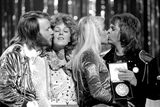‘Cathal Coughlan was too Cork to see himself as a freak’: Luke Haines of the Auteurs on musical mavericks
The Auteurs founder on the great oddballs of music, his late friend Cathal Coughlan and why he prefers the Virgin Prunes to U2
‘Rock ‘n’ roll is intuitive and magical’: Luke Haines
In the opening pages of Freaks Out!, Luke Haines’ riotous, polemical and idiosyncratic new memoir (of sorts), he lists a selection of people — and groups of people — for whom the book is not intended. Just about every conceivable reader is in the firing line, including me for having the temerity to be a middle-aged straight white bloke who loves Abba.
But, as the former Auteurs frontman later points out in the book and, indeed, in our lively video interview, not everything he says should be taken seriously. That said, when he writes that “no-one cool has ever liked Prince”, he seems to absolutely believe it.
He chuckles mischievously when I bring up the offending line. “My editor had serious concerns about that one,” he says, “but then I think all book editors really like Prince. He said to me, ‘You can’t say that because Miles Davis said Prince was a genius’. I came back and said, ‘That’s Miles Davis in the ’80s and Miles Davis in the ’80s was terrible, so I’m not having that.’”
And it’s not just dead musicians who get it with both barrels. Freaks Out! would probably make for excruciating reading for Brian Eno. “He’s one of my bête noires.” He’s much kinder about Peter Gabriel, who he praises as once being “one of Britain’s weirdest motherf***ers”. In fact, most members of Genesis get Haines’ freak stamp of approval.
And, although he is a fan of the most famous band of them all, he declares that “the Beatles ruined rock ‘n’ roll for everyone else.” That chapter is especially worth your time.
The book is a celebration of those musicians — from early rock ’n roll idol Gene Vincent to Steve Pereguin Took, co-founder of Tyrannosaurus Rex with Marc Bolan — who doggedly followed their own path. It’s also a reminder that the rock and pop of yesteryear tended to elevate genuinely weird and unusual figures.
A case in point is provided by the big success of the Morris On album in 1972 with its folk ditties inspired by the arcane English practice of Morris dancing. “I don’t think anything like that would do as well today,” he says, “but I am mindful of not being an old guy who’s dismissive of all modern music.”
It doesn’t get much more contemporary than Taylor Swift, and she occupies his thoughts on the book’s most out-there chapter. Swift, he rules, is most definitely not a freak. “I wrote that about six months or so ago,” he says, “but maybe it’s because of that American football player [her partner, Travis Kelce], but right now, all there is is Taylor Swift.”
Music history is littered with figures who played the game, who embedded themselves in the industry, who enjoyed the fame and fortune that their talents so often deserved. But Haines is more interested in those gifted souls who had far less success, or for whom some might think squandered their talents.
He celebrates bands such as the Virgin Prunes, who remain a cultural footnote, unlike their friends and fellow Dubliners, U2, who were unstinting in their pursuit of becoming the world’s biggest band. Haines was surprised to learn that the Prunes’ Dik Evans — the Edge’s brother — was briefly a member of the embryonic U2.
“The book is essentially a manifesto,” he says. “There are professionals and then there are those who are not professionals” — essentially musicians who know what they’re about — “I’m certainly not a professional. I like bands when they are not in their professional period, when they bring out that disastrous third album.”
Read more
This is Haines’ fourth book and while he won much acclaim for Bad Vibes, his alternative history of the Britpop years, he is best known as the frontman and founder of the Auteurs. The band’s marvellous first album, New Wave, from 1992, as pipped to the Mercury Music Prize by Suede’s self-titled debut — by a single vote. A single, Show Girl, was a crossover hit, but for them most part, Haines’ hyper-literate songs fell on deaf ears.
Subsequent critics have suggested the album was Britpop milestone. The prolific English writer Paul Thompson argues that New Wave laid the groundwork for what would become Britpop. For me, the album exists on its own private universe, quite at odds with anything that Blur, Oasis and the rest went on to deliver.
Haines is a self-confessed freak. Had he been more ‘professional’, would the Auteurs have been much bigger than they were?
“I don’t think I’d have been capable of it,” he says. “I don’t have any regrets about the way I did things, or not having 15 top 10 singles. I’m pretty happy with the records I’ve made.”
Being unprofessional, he adds, was simply part of his makeup.
“But I did have a brief professional period and that was on the second Auteurs album. The first one was sort of done on our own and the record company simply put it out. The ‘plan’ only kicked in on the second album. It was more expensive than the first and there was greater expectation. But I realised quickly that I didn’t really want that [pressure]. I didn’t want that every 18 months.”One of the figures he writes about — with great affection — is his friend the late Cathal Coughlan. Although he hadn’t listened to Coughlan’s bands, Microdisney and the Fatima Mansions, while they were at large, the two would make music together years later. The North Sea Scrolls, the project the pair formed with Andrew Mueller and billed as “an alternative history of the British Isles”, was critically praised, but caused tiny ripples.
“We certainly had a mission when we worked together. We had a shared sense of humour. I think he would have enjoyed the book, but he wouldn’t have regarded himself as a freak. He was too ‘Cork’ for that! I hope people know what I mean.
“We wanted to pull things apart at the seams when we worked together — we wanted to cause a bit of trouble. In person, he was a very gentle, eloquent and dry man, but at that point he was so disgruntled with music and some of the contracts that he was in that I was probably the ideal partner for him to work with. We remained friends ever since and we probably would have worked together again had he not died.” Coughlan’s death from cancer in 2022 hit him hard.
Although Haines never again attained the sort of exposure he had in the early 1990s, despite his next band, Black Box Recorder, flirting with the charts, he has had little trouble in attracting big-name collaborators.
A somewhat surprising figure in the Luke Haines story is Steve Albini. One of the most in-demand producers of the 1980s and 1990s, thanks to his work with Pixies and Nirvana, he agreed to produce the Auteurs’ underrated third album, After Murder Park, which was released in 1996.
“Steve is very much not a freak,” Haines chuckles. “I can’t speak for him, of course, but to me he’s always been much more into the idea of being a professional engineer in the studio than being in a rock band.”
[REM guitarist Peter Buck] is a bit of a freak and I think he’d admit it, too. There’s not much I could spring on him that he hasn’t heard
A somewhat surprising figure in the Luke Haines story is Steve Albini. One of the most in-demand producers of the 1980s and 1990s, thanks to his work with Pixies and Nirvana, he agreed to produce the Auteurs’ underrated third album, After Murder Park, which was released in 1996.
“Steve is very much not a freak,” Haines chuckles. “I can’t speak for him, of course, but to me he’s always been much more into the idea of being a professional engineer in the studio than being in a rock band.” Albini has been a member of a disparate collection of bands, including Big Black and Shellac.
One of Haines’ more recent ones is REM guitarist Peter Buck. “He’s a bit of a freak and I think he’d admit it, too. We’re both, pretty much, into the same sort of stuff. There’s not much I could spring on him that he hasn’t heard and there haven’t been too many differences when we record.”
So far, there have been two collaborative albums, including 2022’s splendidly titled All the Kids Are Super Bummed Out. Recording for a third will take place this year.
“I don’t know what it is that we have together,” Haines says, “but it works. We were sort of thinking it’s best to not question [their musical chemistry] and just continue.
“So much of rock ‘n’ roll is intuitive and magical and you mustn’t question it.”
‘Freaks Out! Weirdos, Misfits and Deviants — The Rise and Fall of Righteous Rock ’n’ Roll’ is published next week
Join the Irish Independent WhatsApp channel
Stay up to date with all the latest news











